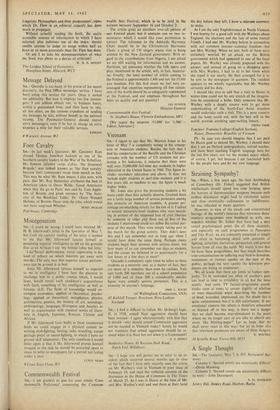Straining Sympathy?
SIR, —When, a few years ago, the then Archbishop of Canterbury (Dr. Fisher) suggested that British intellectuals should spend less time harping upon the horrors of thermonuclear weapons because such endless disCussion might lead to emotional satiety and thus—eventually—callousness or indifference, he was ridiculed in many quarters.
However, in view of the steady and concentrated barrage of the world's miseries that television docu- mentary programmes now bombard us with, one wOnders whether Dr. Fisher may have had a very sound psychological point. On all three channels, and especially on such programmes as Panorama and This Week, we are constantly presented at length and often in harrowing detail with accounts of fighting, atrocities:starvation. persecution and general horror from all over the earth. My worry is not that we have these programmes, but that much merciless over-concentration on suffering may lead to boredom, resentment or (worse) apathy on the part of the public: perhapi the very apathy the television pro- ducers are trying to counteract.
We all know that there are limits to human sym- pathy. To be reminded too often of another's pain can lead in time to irritability in all but the most saintly. And some TV factual-programme sound- tracks seem at times to savour slightly of nihilism or even masochism when describing the numbers of dead, wounded, imprisoned. etc. No doubt this is quite unintentional.• but it is still unfortunate. If our emotional concern for others is therefore exhausted or drained off in this way, is there not a danger that we shall become over-stimulated to the point where we no longer care or are able to absorb any more, like blotting-paper? Let us hope that we shall never react in this way; but let us hope also that television producers are aware of these dangers. K. moantngesRril 34 Kemble Road, Forest Hill. SE23


































 Previous page
Previous page